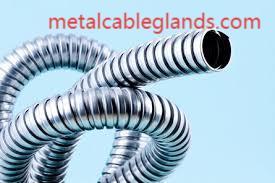In today’s rapidly evolving industrial landscape, the Flexible Steel Conduit plays an indispensable role in ensuring reliable cable protection and efficient wiring management. Its combination of flexibility, mechanical strength, and corrosion resistance makes it ideal for a wide range of applications — from power transmission to renewable energy systems. Zhejiang Hongjue S Connector (HJSI) continues to refine the design and performance of each Flexible Steel Conduit, providing customized solutions that enhance safety, durability, and installation efficiency.
Flexible steel conduits are used extensively in sectors that require robust protection against mechanical and environmental stress. In telecommunications infrastructure, they serve to shield sensitive signal cables from interference, vibration, and external damage. The conduit’s spiral structure allows it to bend and flex around complex layouts without compromising cable integrity, which is crucial in densely wired systems such as data centers or 5G network installations. By integrating HJSI’s precision-engineered conduits with compatible fittings and glands, telecom operators can achieve superior system stability and long-term reliability.
In the renewable energy sector, flexible steel conduits provide critical protection for cabling in solar farms, wind turbines, and hydroelectric plants. These environments often involve outdoor exposure, temperature fluctuations, and mechanical movement. The conduit’s corrosion-resistant metal structure ensures long service life and minimal maintenance requirements, even under challenging weather conditions. HJSI’s product line incorporates enhanced sealing features that prevent moisture ingress, supporting reliable operation in both humid and dry environments.
Industrial automation represents another major application area for flexible steel conduits. Machinery and robotic systems often require frequent motion, and traditional rigid conduit systems cannot accommodate such flexibility. The interlocked design of flexible conduits allows cables to move freely while remaining protected from abrasion and mechanical fatigue. HJSI’s engineers design conduits that maintain consistent strength and curvature across repeated bending cycles, enabling manufacturers to improve operational uptime and reduce maintenance costs.
In transportation and infrastructure projects, flexible steel conduits are used in railway systems, tunnels, and public lighting installations. Their ability to resist impact, vibration, and environmental degradation makes them ideal for long-term use in public safety systems. HJSI ensures that its conduits comply with international standards for fire resistance and corrosion protection, offering peace of mind for critical infrastructure engineers.
Selecting the right type of flexible steel conduit involves several key considerations: installation environment, mechanical stress level, chemical exposure, and cable type. For static environments such as building wiring, interlocked conduits with thicker walls offer greater protection. In contrast, continuously wound conduits are better suited for dynamic environments requiring frequent bending. HJSI assists customers with detailed technical support, helping them choose the correct conduit specification based on application needs and safety requirements.
Another important factor in conduit selection is material compatibility. Galvanized steel conduits provide cost-effective performance for general applications, while stainless steel types are recommended for marine or high-humidity environments. When paired with precision-engineered connectors and glands, the conduit system achieves full sealing performance and EMI protection. HJSI’s comprehensive product range ensures compatibility across all conduit sizes, accessories, and mounting systems, simplifying design and installation processes.
Beyond performance, flexible steel conduits contribute to improved organization and visual appeal in industrial wiring layouts. Their sleek metallic appearance and modular design promote efficient cable routing and easier maintenance access. This practical advantage is particularly valuable in high-density equipment installations, where clear cable management enhances both safety and service efficiency.
Zhejiang Hongjue S Connector (HJSI) continues to lead innovation in conduit and cable protection systems. Through continuous research and advanced manufacturing, the company delivers solutions that combine durability, flexibility, and long-term reliability.To learn more about HJSI’s flexible steel conduit systems and explore product details, visit https://www.metalcableglands.com/ .



